The exodus continues...
The Irish women's team is leaking talent and experience, but why?
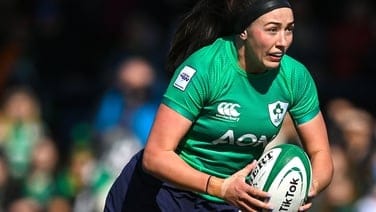
Today we heard the sad news that Irish captain Nichola Fryday has retired from international rugby with immediate effect. Fryday, having earned her first cap in 2016, who became captain in 2021, her retirement is a huge loss. Fryday shared a heartfelt post on her Instagram account to announce the news, which didn’t come as a shock to some and certainly not to me.
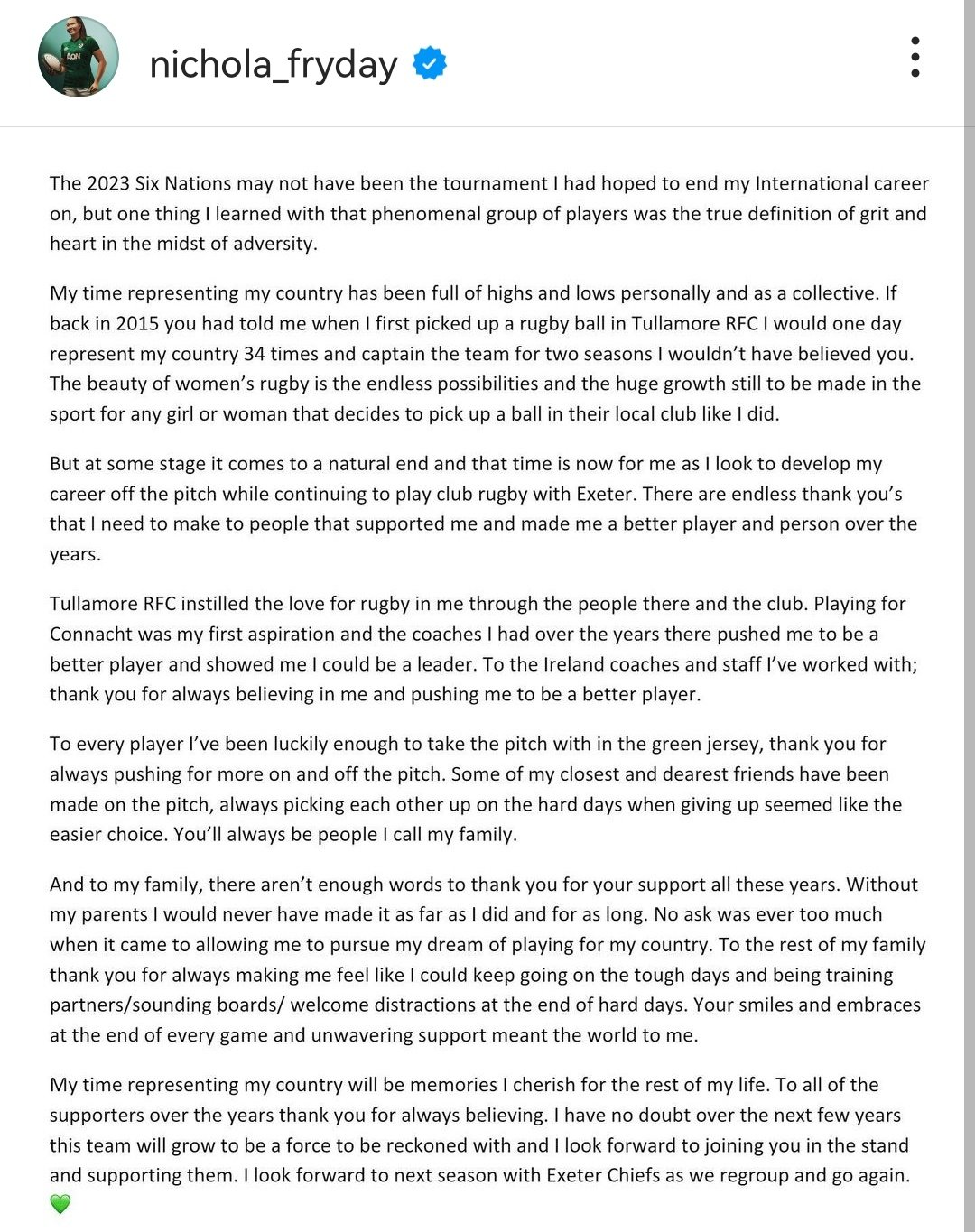
Fryday is the second captain to step down in two years, with her predecessor Ciara Griffin stepping away from rugby entirely in 2019 following our failure to qualify for the World Cup.
Many may claim they weren’t up to it, or try to lay blame at their feet, but it’s not an anomaly, it’s a pattern and not one limited to captains.
A pattern
In recent years, we have seen many high profile players step away from international rugby. Some made a decision themselves, others appear to have been exiled. Of note, in addition to the captains, most recently we have seen Anna Caplice, Katie O’Dwyer and Claire Molloy among others, step away formally from international rugby, though continuing to play club rugby.
We see experienced players such as Clíodhna Moloney and Ciara Cooney playing top flight rugby in the UK, but they don’t seem to be considered at all, with none in the most recent competition camps.
Player criticism
In the wake of a disappointing World Cup on Irish soil in 2017, we saw a raft of retirements, some expected, some not. Some stayed quiet, others not so much. Former Irish and Connacht player, Ruth O’Reilly, or Truthie Ruthie as some have called her, spoke very candidly to the Irish Times in August 2017, about the issue in the women’s game at international level.
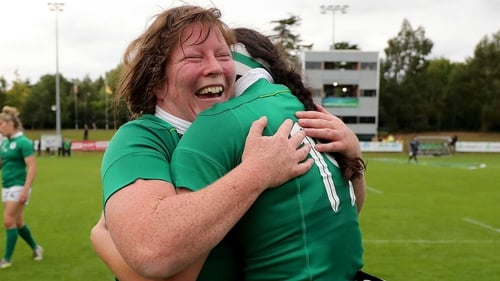
In the bear all article, O’Reilly talk about the dynamic in the squad, the issues they faced, and she didn’t hold back on the details. She offered insight into the much criticised move by Anthony Eddy in 2017 to remove three key players, Hannah Tyrrell, Ali Miller and Sene Naoupu, in the middle of the Six Nations and add them to the sevens squad heading to Las Vegas. She spoke about how the late Tom Tierney, then head coach of the 15s team, shared how he found out at the same time as the players.
Tierney had no say. The powers that be made the decisions, not him. As a coach, he was undermined, excluded from the decision making process.
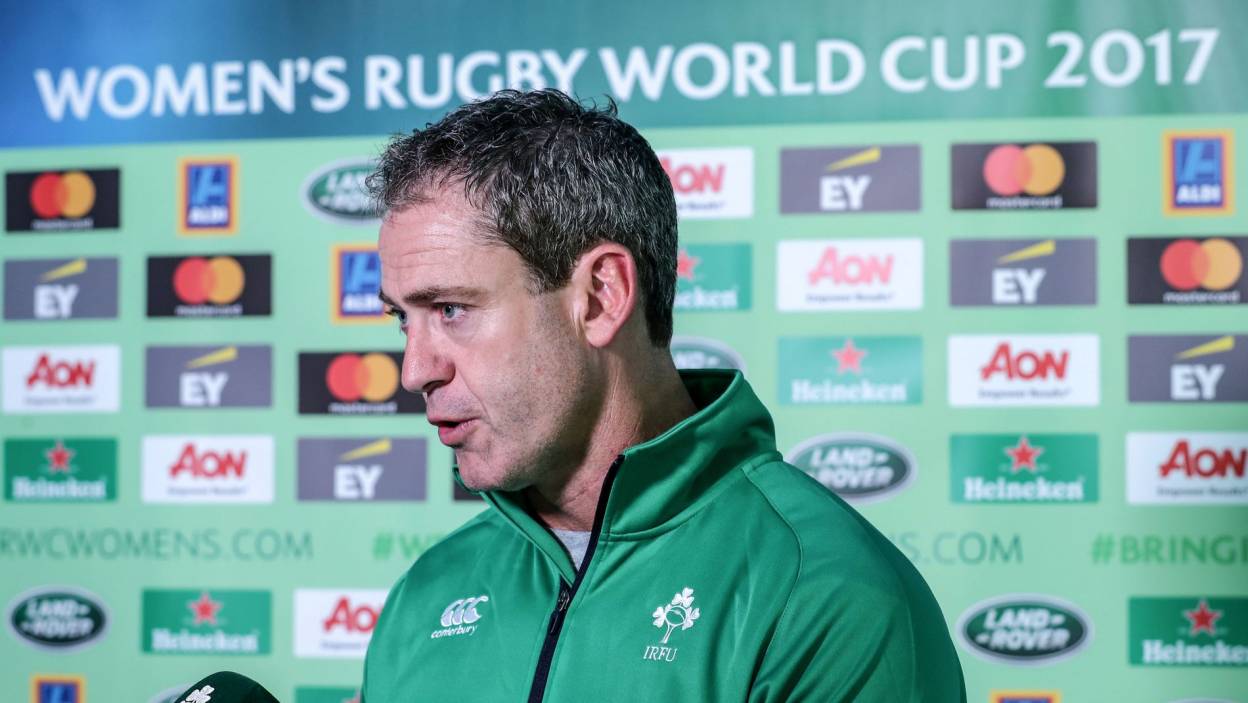
At the time, O’Reilly lamented that Tierney gave mixed messages, saying one thing to them as a squad and another to the media.
“To me, Tom lost us then. What he said out to the public and what he said to us internally were very different. I understand he has to toe the party line but I thought he could have stood up for us more.”
Yet, this frustration and confusion experienced by and shared by coaches is not new; it’s part of the pattern of the IRFU.
Coaching with one hand tied behind their backs
Former coach Philip “Goose” Doyle, who led the Irish side to great success, winning the 2013 Grand Slam, has been very vocal in his criticism of the structures and management in recent years.
When Ireland failed to qualify for the World Cup, Doyle called out Anthony Eddy and the overall management on Twitter, questioning whether they would take any responsibility.

Just this year, Doyle again took to Twitter to call out the “man management” of the IRFU and offered a helping hand. One can only imagine the frustration of a former coach watching the side steadily decline over the last eight years.
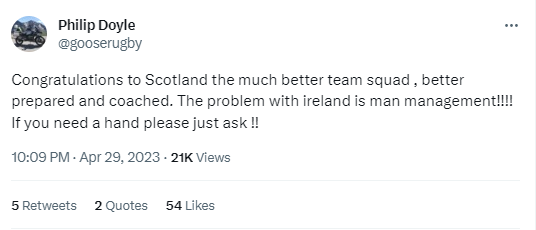
Doyle isn’t the first coach to indicate the overall management is an issue. In April 2021, Adam Griggs the head coach at the time, was asked in a press conference who was running various competitions.
"I couldn’t tell you. Well, I know that we are running it as a body but you are looking for names and I am unable to give you names of who is running it.”
Such a disconnect and lack of understanding were shocking to many at the time. But it’s par for the course.
The Irish team under Greg McWilliams appeared to be more of the same. In November 2021, prior to McWilliams officially taking the helm later that month, Clíodhna Moloney had not held back in her criticism on Twitter of the IRFU’s Director of Sevens and Women’s rugby, Anthony Eddy.
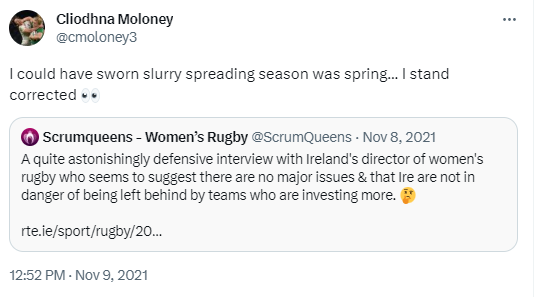
Scapegoating
When you look at what Moloney was criticising, the defensive reflex displayed by many in the IRFU, it is clear that while her criticism was not sensitively worded, it was accurate. Eddy, as predicted by Philip Doyle, had appeared to lay all the blame for failing to qualify for the last World Cup at the players feet. There was no reflection on his role, the strategy or the hier
archy of the IRFU. A ridiculous claim and scapegoating of the players.
Less than a week later, the aforementioned Griffin retired. And shockingly, it’s gone downhill since then with Ireland finishing in rock bottom of the Tik Tok Six Nations for the first time in 21 years this last April.
And what of Moloney? In the wake of her tweet, according to reports, she was contacted by David Nucifora and taken to task. Since that discussion, she has not worn the green jersey again.
Her omission was notable in the next round of international games, the 2022 Six Nations and McWilliams first games in charge. McWilliams assured the media that her omission was a “rugby decision”, a statement that at the time was met with much skepticism. Given the fact that she was later excluded from all competitions under McWilliams, despite her standout form in the Premier 15s.

Kingmaker
Suggestions that Nucifora is the “Kingmaker” of the IRFU are not helped by players being exiled in this fashion. In fact, it appears decisions are made for the women’s game by people who either do not understand it, or do not care for it.
In October 2022, the IRFU announced the first ever professional contracts being offered to women, albeit Paddy last in the pool of Six Nations teams (pun intended). However, the details were problematic.
Players are expected to take up full time employment on between €15,000 and €30,000 and centralised to Dublin. A number of high profile players, including captain Nichola Fryday turned this down and later manager Gemma Crowley stepped away, with rumours the contract issues were to blame. It appeared to be another shortsighted decision by the IRFU that did more harm than good.
Another reschuffle
The IRFU has a history of repeatedly claiming there is nothing wrong, and yet keep coming up with new solutions to problems that they claim do not exist. We see new strategies and new initiatives announced frequently on the green grass or in the stands of the Aviva stadium, with the senior women of the IRFU used in promo photos, and yet we see little progress.
Every year for the last six years, the AIL has been restructured. This has been seen as detrimental to the women’s domestic game, with many stating they were burnt out and one player telling me they had to beg players to finish the season.
Last season, the AIL captains decided to join forces and develop a player survey, with the intention of presenting it to the IRFU Women’s Committee, on which no AIL club representative sits, in what could be considered a collective voice. My sources tell me that voice was not heard.

The chair of the Women’s Committee, Fiona Steed, apparently would not allow the captains to present their findings but offered assurances it would be considered. It appears however, that much of their suggestions for improvement of the women’s AIL was disregarded when the new structure was decided.
The future
So, the team currently finds itself without a manager, a captain, and a coach for the second time in two short years. One would have to think that any prospective coach would need to carefully consider their decision, and demand not only autonomy in selection, but a management overhaul. No coach will want to enter a situation where they have little control, but all the responsibilities.
The management must find a balance where coaches and players are enabled, they must earn the trust of players who have been scapegoated and exiled in the past. They must make demands of the board that they will be supported and resourced, and that the governance be overhauled to the point that the women’s game is truly embraced with ambition and passion. Until then, we will see more of the same…
In the words of “Truthie Ruthie” which still ring true six years later,
“The guys in the blazers and fancy ties need to decide if this is something they are serious about.”
The Irish Women’s Rugby Supporters Club